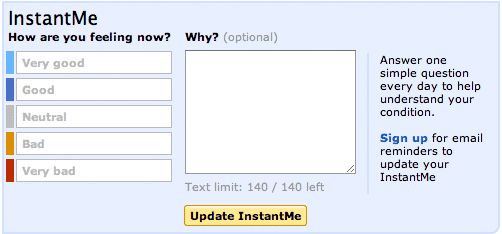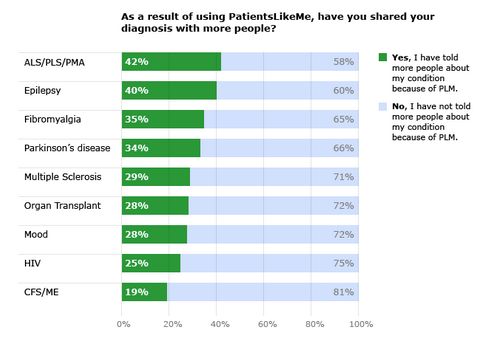On Tuesday, we recognized Mental Illness Awareness Week (October 2-8) by sharing some of our mental health members’ vivid descriptions of what depression feels like. Today, we’ve taken a look at what else our members are sharing – or not sharing – about more than a dozen mental health conditions at PatientsLikeMe.
On the site, more than 80% of our active mental health members (meaning, those who have logged in during the last 60 days, n=1,589) are capturing the various factors affecting their mood and sharing those experiences with patients like them. 1,339 have posted an InstantMe update (shown above) to record their moment-to-moment status, and 843 have completed a weekly Mood Map survey.
But what about sharing in the real world – outside of PatientsLikeMe? In a poll we conducted earlier this year, we discovered that patients with a mental health condition are, along with HIV patients, the least likely to share their diagnosis with others. For instance, overall results suggest that when it comes to immediate family, 81% of respondents say “all of them” know about the diagnosis. However, in HIV, this figure is only 50%, and in mental health conditions, it’s 56%.
Interestingly, however, our poll also found that PatientsLikeMe members have shared their diagnosis with more people as a result of using the website. For mental health conditions (formerly called mood conditions at PatientsLikeMe), 28% of respondents said they had told more people about their condition as a result of PatientsLikeMe, as the graphic above illustrates. Here’s how one mental health member explains it:
“Although I have not created a large number of [forum] posts on PatientsLikeMe, just the few posts that I created gave me confidence in explaining my condition and how it has impacted my life. PatientsLikeMe allowed me to explore others’ perceptions of their experiences. Knowing I ‘belonged’ here, and was understood here was valuable in my recovery. So being comfortable here, at PatientsLikeMe, made me feel more comfortable discussing my diagnosis away from PatientsLikeMe.”
This, of course, speaks to the stigma surrounding mental illness, which is something Mental Illness Awareness Week aims to change. (The 2011 theme is “Changing Attitudes, Changing Lives.”) At PatientsLikeMe, we think change comes from getting to know real patients living with real mental health conditions. As one person commented on our Facebook page, “I always see people making fun of 'crazy' people, frivolous jokes including depression and bipolar, and movies that skew the severity, understanding and seriousness of these disorders.”
Can sharing your mental health experiences help erase the stigmas and stereotypes? The Academy Award-winning actress Glenn Close, whose sister has bipolar disorder, certainly believes so, as she writes in a great article entitled “The Stigma of Silence.” She argues that talking openly about mental illness with “more candor, more unashamed conversation” can “deconstruct and eliminate stigma.” We believe so too, but we’d love to hear your thoughts in the comments section.


